I wish brain doctors could come up with the reason why certain memories fire through decades of burial, at the most incongruous times.
I grew up in an economically eclectic neighborhood. We were the poor Italians. There were a couple of comfortable Italian families, one or two poor German families, at least one middle-class German family... Now these weren't immigrant Italians and Germans...and Poles and Slovaks...but the children -- and probably grandchildren -- of these immigrants, just like my father is.
Right next door to us to the south was the only Mexican family on the block, the Fonsecas. I don't know if the mother and the father had come FROM Mexico, or if they were the children of immigrants, but they spoke Spanish to each other, Mrs. Fonseca speaking only Spanish, and Mr. Fonseca a heavily accented, very broken English, except when he was speaking Spanish to his family or other Hispanic friends. They were poor as well.
Theirs was a large family, just like ours, but with four boys and two girls. All of the Fonseca children are older than I am, all but one of or beyond high school age when I was still in diapers. The one exception is Ben, his father's namesake, so he was called, simply, "Junior."
Junior is one year older than I am, and, with no other boys on the block close to us in age, it was almost required of us to be friends. Junior and I had our ups and downs, as friends often do, with his sensitivities and mine often working against each other. As I have written in the past, my family was poor, but I never knew that. I have the same understanding about the Fonsecas. It seems to me now that Junior's family made him more aware of their circumstances than my family made me aware of ours. Mr. Fonseca was a laborer/entrepreneur. He owned a tractor, the kind you might see on a very small farm. In the summer he attached a mower unit to the back and earned money mowing people's fields. In the winter he attached a blade to the thing somewhere and plowed people's driveways and parking lots. In between the plowing and mowing jobs, his garage was employed with fixing cars. Mr. Fonseca did a fair amount of this work, but his sons did quite a lot of it. And as Junior got older, more and more was required of him to help the family earn money. As soon as he could reach the pedals on the tractor, he was mowing the fields. When he was strong enough and had enough practice, he was doing body work on cars.
But I digress. Junior was an employee of his father's enterprise almost as early as he was a member of the family. I never understood this responsibility to his father, and it often affected our friendship.
Junior had some cousins who lived about a mile away, in the next suburb to the north. As I recall, there were five brothers, all ranging in age from about a year younger than I, to about eight years younger. I didn't like these kids. When they came over to visit the Fonsecas they played differently than any of my other friends; the older ones were mean to me, they often spoke Spanish to each other, looking at me, and then laughing...and Junior was at these times in on the joke. Any play with them was usually short-lived, as I wound up either fighting with one or more of them, or I would just walk away and go inside my house.
One summer day -- I figure I was about 9 or 10 years old -- Junior and I saw a kid across the street operating a lemonade stand, and we thought that what that kid deserved was competition! The next day we pulled my wagon out of the shed, and I procured the can of lemonade powder from my mother's cupboard. Junior supplied the water, the Dixie cups and the location -- the sidewalk in front of his house...as that's as far as his water hose would reach. He also brought out some newspaper to lay in the wagon to soak up any spills. It also worked to hide our "till," the money we were raking in selling the cups of lemonade at a nickel each.
We had been working all day and probably had about a whole dollar's worth of loose change underneath the newpaper when, in mid-afternoon, Junior's cousins poured out of their father's car at the curb. We made our sales pitch, and one of them had a quarter. I poured the drink and gave it to him, and he gave his quarter to Junior. Junior flipped up the sheet of newspaper to make the change, exposing our fortune to his cousins' eyes. I don't know now if it's hindsight, or if it was in that moment, but I resented that Junior had flashed our till to them. It seemed inevitable, I guess, but within a few seconds one of the cousins violently threw aside the newspaper -- and the cups and the pitcher of lemonade -- to make a grab for our money. I was so angry he did it that I can't remember if he got any or all of it. From that day forward I refused to have anything to do with those kids, vowing to myself to just leave whenever they showed up.
I recall that the Chicago winters of the mid- to late-1970s were pretty harsh. As happens too often in snow-belt cities, poor people live in inadequately heated homes and they resort to alternative methods to keep warm, some of which are deceptively unsafe. And so it was one evening that following winter when Junior's cousins' family, living in a converted garage across the street from the gradeschool they all attended, went to sleep one winter evening with one of these alternative heating methods in use. I don't remember what it was found to have been -- a space heater or an open oven. Whatever it was, something near it caught fire, and the small apartment was rapidly consumed by the flames, and all but their father were consumed with it.
The memory of this event came to me yesterday while driving to work. Nothing triggered it, that I'm aware of. Later in the day I caught a news headline about a family of 5 who died in a Missouri fire. I found it odd to have thought of Junior's cousins in the morning, and then to see the news story later in the day.
In the aftermath of the tragedy I failed to see the depth of Junior's pain over the loss of his cousins. I could only remember them as I knew them, with dread and animosity. I made a comment about them, something to the effect of how we wouldn't have to worry about them stealing our lemonade money any more, and that deeply hurt Junior, another dent in the finish of our friendship.
Any time their visages swim up to the viewing screen of my memory, I first remember the lemonade stand incident, and how angry it made me. Then I remember that their lives didn't progress much farther past that moment, and that their lives ended in a hell of terror and pain. And I always feel regretful that I hated them so much as a kid, that I made that stupid comment to Junior, and that I don't think of their tragic deaths BEFORE I get to the lemonade stand.
But I guess we remember certain events chronologically, and that serves us to remember life's lessons that way.
Saturday, August 12, 2006
Monday, August 07, 2006
Rare Perfection
Have you ever had one of those days, or one of those projects, where it seems that, no matter what you do, things just work out perfectly?
I took the day off Friday and had planned, among other things, to go grocery shopping and have a steak dinner on the table and ready for Mrs. Farrago's return from work. As it turned out, I spent entirely TOO much time loafing, and ran myself out of time to be able to do anything right, but Mrs. Farrago called from the office to tell me that she had to work late, and she really wasn't hungry, anyway.
Her elderly father, who lives with us, who is dealing with Parkinson's Disease and therefore doesn't always think in a straight line, offered to make a grocery run regardless, and said that we could have the steaks on Saturday instead. I agreed.
Had I gone to the store, I would have picked out the best looking cuts of ribeye, in my opinion the most flavorful cut of steak for the money. And I would have spent just shy of an eternity opening the tops of the corn husks to make sure that the kernels weren't shriveled in any of the ears of corn I picked out. But Mrs. Farrago's father picked the steaks -- top sirloin -- which I feared would be tough as leather by the time they came off the grill. I also noticed that none of the corn husks had been pried open, so it was anybody's guess as to how withered or worm-eaten the corn would be when it got to the table.
Saturday afternoon I fired up the gas grill and started prepping the food. When I husked the corn I saw that each of the three ears was completely unblemished all the way to the tip. Not ONE SHRIVELED KERNEL! Our method for corn-on-the-cob-on-the-grill is to completely husk the ear, then wrap it in aluminum foil and lay it directly on the grate. With the corn over the rear burner, I cut the rind of fat/gristle off of the steaks and noticed that each eight-ounce cut appeared to be a little more marbled than I expected. I ground just a little black pepper on one side of each steak and then put them on the grill, peppered side down. Then I ground another light dusting of pepper on the bare side. All three burners were on high, and I left them that way to sear the steaks two minutes on one side and two minutes on the other. I flipped the steaks again, rolled the corn 180 degrees, and I turned the two front burners to medium and closed the lid.
I went inside fully intent on returning in five minutes to flip the steaks and roll the corn, but I was distracted, and it was probably more like six or seven minutes. A minute or two doesn't sound like much, but it's surprising what that length of time over a flaring, flaming grill can do to a fine piece of meat. I ran out to the grill to find just the bare minimum of flames flaring up to lick at the steaks. I turned them each one last time, admiring the deep brown bars that the grill slats had seared into the steaks. The flesh looked just a little too crispy, however, and I feared that I had ruined at least one of them.
Another five minutes over the covered heat and I plucked the steaks and the corn off of the grill and brought them inside. Just to make sure, I cut open each steak to make sure it was done. Each looked a little too pink, but not raw.
We sat down to dinner and I put the first morsel of meat into my mouth, and I could not believe it was I who had cooked this humble little piece of bovine flesh to such tender, juicy, medium-rare perfection!! It was no Filet Mignon, but it certainly changed my mind about sirloin! And the corn! It was sweet, and tender, and cooked just right to golden perfectness! It made mundane old butter seem a heavenly nectar!
All too soon it was over. We three sat there panting and practically licking our plates clean and wishing each steak had been about three ounces more, each ear of corn about two inches longer!
I am not a cook. I am grillmaster by default, since Mrs. Farrago will not go near the grill. I have a repertiore of burgers, steak, salmon and chicken. None of my preparations have fancy names around them, just what they is; I am a blue-collar griller. And too often I burn one or more parts of the meal. But not Saturday. Saturday the god of fire or the ghost of Julia Child or something smiled favorably down upon me and granted me that elusive culinary perfection.
Now if only such an occurrence could flare up like a cold or a rash, and last for days....
I took the day off Friday and had planned, among other things, to go grocery shopping and have a steak dinner on the table and ready for Mrs. Farrago's return from work. As it turned out, I spent entirely TOO much time loafing, and ran myself out of time to be able to do anything right, but Mrs. Farrago called from the office to tell me that she had to work late, and she really wasn't hungry, anyway.
Her elderly father, who lives with us, who is dealing with Parkinson's Disease and therefore doesn't always think in a straight line, offered to make a grocery run regardless, and said that we could have the steaks on Saturday instead. I agreed.
Had I gone to the store, I would have picked out the best looking cuts of ribeye, in my opinion the most flavorful cut of steak for the money. And I would have spent just shy of an eternity opening the tops of the corn husks to make sure that the kernels weren't shriveled in any of the ears of corn I picked out. But Mrs. Farrago's father picked the steaks -- top sirloin -- which I feared would be tough as leather by the time they came off the grill. I also noticed that none of the corn husks had been pried open, so it was anybody's guess as to how withered or worm-eaten the corn would be when it got to the table.
Saturday afternoon I fired up the gas grill and started prepping the food. When I husked the corn I saw that each of the three ears was completely unblemished all the way to the tip. Not ONE SHRIVELED KERNEL! Our method for corn-on-the-cob-on-the-grill is to completely husk the ear, then wrap it in aluminum foil and lay it directly on the grate. With the corn over the rear burner, I cut the rind of fat/gristle off of the steaks and noticed that each eight-ounce cut appeared to be a little more marbled than I expected. I ground just a little black pepper on one side of each steak and then put them on the grill, peppered side down. Then I ground another light dusting of pepper on the bare side. All three burners were on high, and I left them that way to sear the steaks two minutes on one side and two minutes on the other. I flipped the steaks again, rolled the corn 180 degrees, and I turned the two front burners to medium and closed the lid.
I went inside fully intent on returning in five minutes to flip the steaks and roll the corn, but I was distracted, and it was probably more like six or seven minutes. A minute or two doesn't sound like much, but it's surprising what that length of time over a flaring, flaming grill can do to a fine piece of meat. I ran out to the grill to find just the bare minimum of flames flaring up to lick at the steaks. I turned them each one last time, admiring the deep brown bars that the grill slats had seared into the steaks. The flesh looked just a little too crispy, however, and I feared that I had ruined at least one of them.
Another five minutes over the covered heat and I plucked the steaks and the corn off of the grill and brought them inside. Just to make sure, I cut open each steak to make sure it was done. Each looked a little too pink, but not raw.
We sat down to dinner and I put the first morsel of meat into my mouth, and I could not believe it was I who had cooked this humble little piece of bovine flesh to such tender, juicy, medium-rare perfection!! It was no Filet Mignon, but it certainly changed my mind about sirloin! And the corn! It was sweet, and tender, and cooked just right to golden perfectness! It made mundane old butter seem a heavenly nectar!
All too soon it was over. We three sat there panting and practically licking our plates clean and wishing each steak had been about three ounces more, each ear of corn about two inches longer!
I am not a cook. I am grillmaster by default, since Mrs. Farrago will not go near the grill. I have a repertiore of burgers, steak, salmon and chicken. None of my preparations have fancy names around them, just what they is; I am a blue-collar griller. And too often I burn one or more parts of the meal. But not Saturday. Saturday the god of fire or the ghost of Julia Child or something smiled favorably down upon me and granted me that elusive culinary perfection.
Now if only such an occurrence could flare up like a cold or a rash, and last for days....
Sunday, August 06, 2006
Travelog San Francisco
Having been there for any duration worth mentioning only twice before, and at those times my freedom to roam dictated by my work schedule, I looked to this vacation as one who had never been to San Francisco. There were things and places I had seen in my earlier visits, but I had no time to explore them before. This time I was there for fun, and Mrs. Farrago was with me!
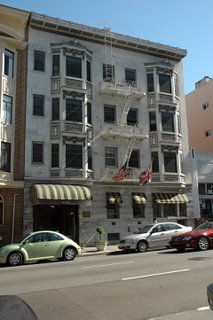
We arrived Sunday afternoon, July 16, 2006, checked in to our hotel, the White Swann Inn, and took in the main avenue of Chinatown. In the evening we enjoyed a quiet dinner at Café Claude, nestled in the alley named Claude.


On Monday we met Rik, the Golden Gate Greeter provided by our hotel. He took us out to Haight-Ashbury and to Golden Gate Park. It was a long, though thoroughly enjoyable, 3-hour walk. In the evening Mrs. Farrago and I dined on sushi at Sushi-man, right next door and perilously close to the Nob Hill theatre, with its all male, nude review, featuring Big Giovanni.
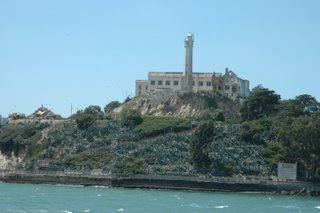
Tuesday we walked UP Mason Street to California Street, where we took the cable car down to Market Street. From there we walked the Embarcadero to Pier 41 and our scheduled departure to Alcatraz Island. The historical building there that was the famous prison is an experience that must be had. Don’t let anyone discourage you by saying it’s just a tourist attraction. It’s an interesting, vital piece of the city’s history. And save yourself a few extra bucks by booking directly with Blue and Gold Fleet, as they’re the only ones with docking rights at Alcatraz.
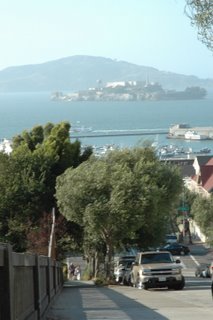
Tuesday evening, due to the fact that the Hyde Street cable car line was not working, and there was a dearth of buses heading in the direction we wanted to go, Mrs. Farrago and I climbed four blocks up Hyde Street to view Lombard Street, the “crookedest street” in the country, perhaps the world. Then we climbed another four blocks, turned right and walked down four more blocks until we arrived at The Matterhorn, a Swiss fondue restaurant. It was during these afternoon walks that I discovered I would rather climb up the hills than walk down, as walking down caused me considerable shin pain. Why? Who knows?

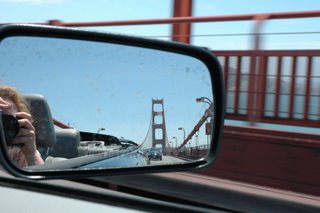
Wednesday, after an inexorably long wait for a rental car (a Mustang convertible!), we drove over the Golden Gate Bridge and up to Napa Valley, stopping in the town of Napa for a brief wine tasting before heading up to St. Helena and our Bed & Breakfast, the Ink House. Dinner was at Cindy’s Back Street Kitchen, and was quite delicious.
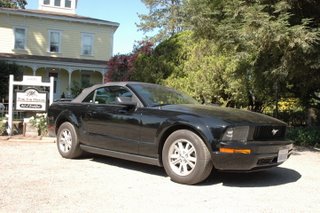

Thursday morning we visited the Rombauer (think “The Joy of Cooking”) winery for a tour of their half-mile of man-dug caves and a tasting. For lunch we wound up back at Cindy’s, and it was just as delicious. That afternoon was a tour and tasting at the Hall winery in St. Helena by a friend who works there. Thursday night found us at Michael Chiarello’s Tra Vigne Ristorante, stuffing down the delicious veal and papardelle dishes despite having not yet fully digesting lunch!


Friday morning was a quick tour of Hall Rutherford winery with our same friend, and then we were on our way back to San Francisco by way of the Sonoma Valley which, in our opinion, was far inferior to the Napa Valley. Dinner with friends at Scoma’s restaurant at Fisherman’s Wharf, and to our hotel near the airport to continue digesting Wednesday’s dinner!!
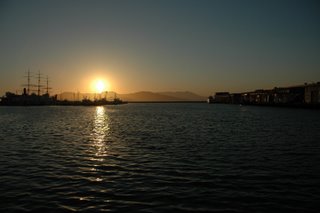
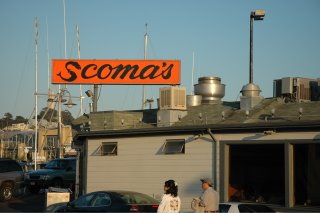
Saturday, July 22, 2006, was a late wake-up, turn in the car and hop on the plane back home.
San Francisco has a quirky vitality. Her attitude shaped by – and in spite of – calamity, she is a stubborn city, audaciously perching on hillsides and precipitous streets despite hardship and extra effort required to traverse them. Residents seem oblivious to the hardship, effort and hazards, not to mention her contrary and somewhat bizarre weather patterns. An outsider, winded from a one-block, 30 percent grade, 50-foot climb in altitude, may at first find it difficult to understand one’s love for this city. But it is there, as fierce a passion as anyone can have for a patch of earth.
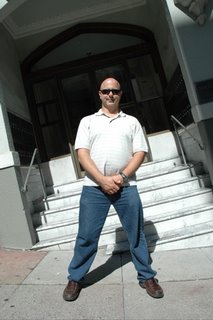
It is her vitality that seduces a visitor. How can cold summer weather, near-vertical traffic arteries and the ever-present threat of “the big one” win over the hearts and minds of so many people? I don’t know, but there she is, that glowing, golden City By the Bay, bustling and humming, clinging to those impossibly steep hills like bees to a hive.


We arrived Sunday afternoon, July 16, 2006, checked in to our hotel, the White Swann Inn, and took in the main avenue of Chinatown. In the evening we enjoyed a quiet dinner at Café Claude, nestled in the alley named Claude.


On Monday we met Rik, the Golden Gate Greeter provided by our hotel. He took us out to Haight-Ashbury and to Golden Gate Park. It was a long, though thoroughly enjoyable, 3-hour walk. In the evening Mrs. Farrago and I dined on sushi at Sushi-man, right next door and perilously close to the Nob Hill theatre, with its all male, nude review, featuring Big Giovanni.

Tuesday we walked UP Mason Street to California Street, where we took the cable car down to Market Street. From there we walked the Embarcadero to Pier 41 and our scheduled departure to Alcatraz Island. The historical building there that was the famous prison is an experience that must be had. Don’t let anyone discourage you by saying it’s just a tourist attraction. It’s an interesting, vital piece of the city’s history. And save yourself a few extra bucks by booking directly with Blue and Gold Fleet, as they’re the only ones with docking rights at Alcatraz.

Tuesday evening, due to the fact that the Hyde Street cable car line was not working, and there was a dearth of buses heading in the direction we wanted to go, Mrs. Farrago and I climbed four blocks up Hyde Street to view Lombard Street, the “crookedest street” in the country, perhaps the world. Then we climbed another four blocks, turned right and walked down four more blocks until we arrived at The Matterhorn, a Swiss fondue restaurant. It was during these afternoon walks that I discovered I would rather climb up the hills than walk down, as walking down caused me considerable shin pain. Why? Who knows?


Wednesday, after an inexorably long wait for a rental car (a Mustang convertible!), we drove over the Golden Gate Bridge and up to Napa Valley, stopping in the town of Napa for a brief wine tasting before heading up to St. Helena and our Bed & Breakfast, the Ink House. Dinner was at Cindy’s Back Street Kitchen, and was quite delicious.


Thursday morning we visited the Rombauer (think “The Joy of Cooking”) winery for a tour of their half-mile of man-dug caves and a tasting. For lunch we wound up back at Cindy’s, and it was just as delicious. That afternoon was a tour and tasting at the Hall winery in St. Helena by a friend who works there. Thursday night found us at Michael Chiarello’s Tra Vigne Ristorante, stuffing down the delicious veal and papardelle dishes despite having not yet fully digesting lunch!


Friday morning was a quick tour of Hall Rutherford winery with our same friend, and then we were on our way back to San Francisco by way of the Sonoma Valley which, in our opinion, was far inferior to the Napa Valley. Dinner with friends at Scoma’s restaurant at Fisherman’s Wharf, and to our hotel near the airport to continue digesting Wednesday’s dinner!!


Saturday, July 22, 2006, was a late wake-up, turn in the car and hop on the plane back home.
San Francisco has a quirky vitality. Her attitude shaped by – and in spite of – calamity, she is a stubborn city, audaciously perching on hillsides and precipitous streets despite hardship and extra effort required to traverse them. Residents seem oblivious to the hardship, effort and hazards, not to mention her contrary and somewhat bizarre weather patterns. An outsider, winded from a one-block, 30 percent grade, 50-foot climb in altitude, may at first find it difficult to understand one’s love for this city. But it is there, as fierce a passion as anyone can have for a patch of earth.

It is her vitality that seduces a visitor. How can cold summer weather, near-vertical traffic arteries and the ever-present threat of “the big one” win over the hearts and minds of so many people? I don’t know, but there she is, that glowing, golden City By the Bay, bustling and humming, clinging to those impossibly steep hills like bees to a hive.

Subscribe to:
Comments (Atom)